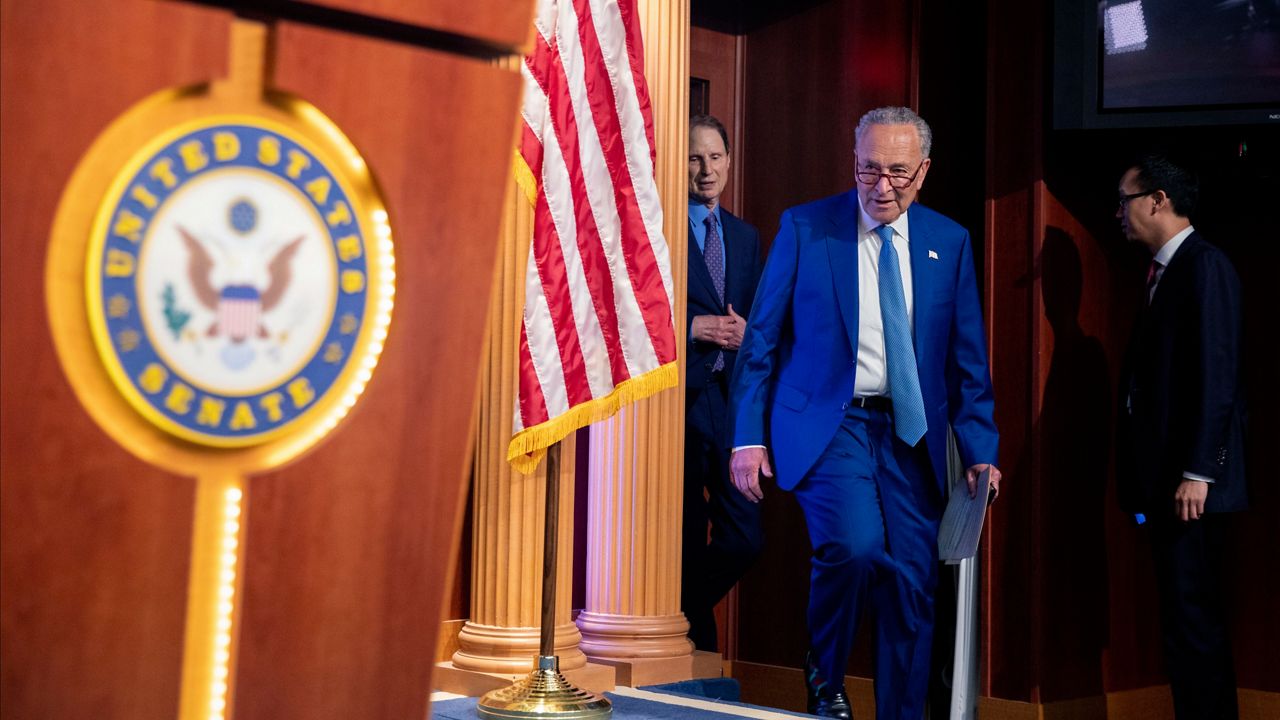On Thursday, three key Democratic Senators unveiled their highly anticipated cannabis bill, a measure that would decriminalize marijuana and allow states to set their own laws without fear of reprisal from the federal government.
"I am proud to be the first majority leader ever to say it is time to end the federal prohibition on cannabis," Senate Majority Leader Chuck Schumer, D-N.Y., said on the Senate floor Thursday.
The bill has faced an uphill battle on both sides of the aisle, but Schumer, Ron Wyden, D-Ore., the top Democrat on the Senate Finance Committee, and New Jersey Sen. Cory Booker continued to forge ahead.
Their bill, known as the Cannabis Administration And Opportunity Act, would expunge federal criminal records for cannabis-related charges, remove marijuana from the list of federally controlled substances, establishes a regulatory structure for cannabis similar to tobacco and alcohol from the Food and Drug Administration, creates grant programs for small businesses and sets up a plan for federal taxes on marijuana.
The Senate Subcommittee on Criminal Justice and Counterterrorism also set a hearing for next week, led by Sen. Booker, entitled “Decriminalizing Cannabis at the Federal Level: Necessary Steps to Address Past Harms.”
While the odds of passing the bill in an evenly divided Senate are low, introducing the bill could change the temperature regarding the discussion of cannabis legislation in Washington, especially with such a high-profile backer in Schumer.
A Gallup poll from last year showed that nearly 70% of Americans support legalizing marijuana. Most Democrats (83%) and Independents (71%) support federal legalization, but Republicans are nearly evenly split, with 50% in favor of legalization and 49% opposed.
Though cannabis is widely supported by the public, per the Gallup poll, and experts say it has proven economic benefits, the measure still faces an uphill battle in Congress.
Schumer has been a backer of Congressional action on marijuana in recent years. In 2018, as Minority Leader, he debuted his plan to decriminalize cannabis at the federal level: “It’s time we allow states, once and for all, to have the power to decide what works best for them.
In 2021, as majority leader, Schumer, alongside Wyden and Booker, unveiled a draft of their cannabis legislation.
An analysis from the ACLU showed that cannabis arrests now account for more than half of all drug arrests in the United States; and while Black and white Americans use marijuana at roughly the same rate, Blacks are nearly four times more likely than whites to be arrested for marijuana, per the analysis.
“For decades, our federal government has waged a War on Drugs that has unfairly impacted low-income communities and communities of color,” Sen. Booker said in a statement last year. “While red and blue states across the country continue to legalize marijuana, the federal government continues to lag woefully behind.
“It is time for Congress to end the federal marijuana prohibition and reinvest in communities most impacted by the failed War on Drugs,” he added.
“Cannabis prohibition, a key pillar of the failed War on Drugs, has caused substantial harm to our communities and small businesses,” said Wyden in a release last year.
The Finance Committee Chair also said on Twitter in April: ”Ending federal cannabis prohibition is urgent business.”
”It’s past time for Congress to listen to the will of the voters,” he added.
Schumer has held meetings with pro-cannabis Republicans in recent months in efforts to pass federal marijuana legislation, including Alaska Sen. Lisa Murkowski and Rep. Dave Joyce, R-Ohio, co-chair of the Congressional Cannabis Caucus.
“The conversation between Leader Schumer and Congressman Joyce was part of an ongoing, broader discussion between both parties and chambers to determine what reform can pass this Congress,” a Joyce spokesperson told cannabis news outlet Marijuana Moment. “It is evidence of the sincere efforts by both the leader and the congressman to find common ground for substantial, bipartisan progress on this issue. The congressman remains hopeful that an agreement can be made and progress can be achieved.”



